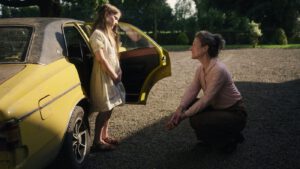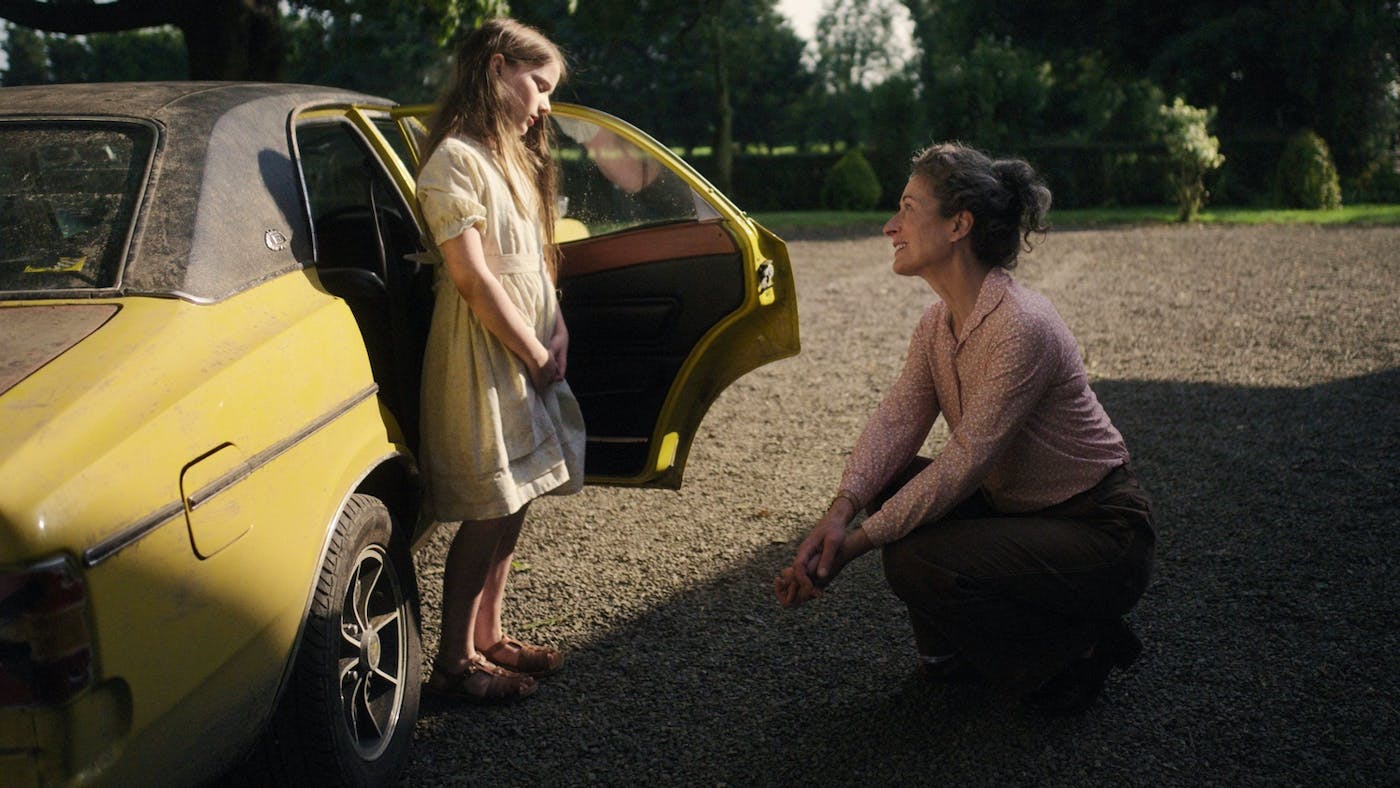Movie Info
Movie Info
- Director
- Colm Bairead
- Run Time
- 1 hour and 35 minutes
- Rating
- PG-13
VP Content Ratings
- Violence
- 0/10
- Language
- 1/10
- Sex & Nudity
- 1/10
- Star Rating
Relevant Quotes
He has told you, O mortal, what is good, and what does the Lord require of you but to do justice and to love kindness and to walk humbly with your God?

Irish director Colm Bairead, with his co-writer Claire Keegan (author of the book the film is based on) has given us a touching story of a young girl from a dysfunctional family provided a chance to blossom despite her distracted parents. This little film has more heart and insight into the human condition than a dozen Marvel Comics films—and thus is one of the reasons I keep going to the movies to find and share such gems. It is so wonderfully made that it is difficult to believe that this is the director’s first feature film!
The story is set in 1981 in a part of County Waterford where Irish Gaelic is mostly spoken (subtitled in English). Nine-year-old Cáit Catherine Clinch), one of several siblings, is withdrawn, often wandering off by herself, much to the consternation of her pregnant Mam (Kate Nic Chonaonaigh), who is so exhausted that she has no time for the child. At school, Cait reads out loud so poorly that the teacher quickly moves on to the next pupil. Regarded as strange, she is either ignored or bullid by her fellow students. Cáit’s Da (Michael Patric) is an alcoholic completely absorbed in himself and probably an abuser. The parents decide to send her off for the summer to the mother’s older cousins who operate a dairy farm several hours away. This without any word of explanation to Cáit.
Eibhlín (Carrie Crowley) and her husband Seán (Andrew Bennett) are far more prosperous than Da and Ma, and this seems something that Da resents. He is barely civil when he drops the girl off and quickly leaves. It is immediately clear that Eibhlín is a compassionate woman by the way she immediately welcomes the girl and tries to make her feel at home. Seán at first by his taciturnity, seems as cold as Da, but this will change.
The girl has left her suitcase in the car, with Da driving away not noticing it. Eibhlín tells the girl that she will provide clothing, but this turns out to be a boy’s shirt and jeans. Cáit continues to speak just a few words, mostly coaxed out of her by her foster mother. Eibhlín tells her that there are no secrets in their house, though Cáit will discover otherwise. She must wonder why a boy’s clothes were on hand, and why is the wall paper in her bedroom full of pictures of trains?
The girl enjoys being given a bath with Eibhlín’s brushing her hair—the woman counts up to a hundred strokes. We assume that the girl’s Mam had never done this for her. Just how sensitively kind Eibhlín’ is we see by the way she handles the incident of the disturbed girl’s bed wedding. Not a hint of reproachment when she discovers the embarrassed girl’s wet gown and mattress—instead she says that the mattress was “weeping” and that she should not have given that one to her.
Both husband and wife are impressed with the girl’s willingness to help with the chores required to run the farm, including walking with Eibhlín to the well to fetch a pail of water. Cáit takes to being shown how to use a carpet sweeper in the house, peel potatoes, and, with Sean, how to clean with a large broom the floor of the cow barn. Eventually Seán shows his growing affection for the girl, not by words—he is almost as quiet as she—but by one night leaving her a cookie as he walks by the table at which she is sitting. In defense of Cait’s quietness he says, “She says as much as she has to say.” “Many’s the person missed the opportunity to say nothing and lost much because of it.” He is the one also who suggests that they drive the girl to town to buy her some dresses.
It is a nosy neighbor who, while questioning Cait about her caregivers, reveals that the reason for Sean’s quietness is his grief over the loss of their young son. Could it be that Cait is what he and his wife need to move on, just as the kindness and love of him and Eibhlín is what the girl needs?
There follows the one dramatic—and near tragic—event that roils the domesticity that Cait so relishes. All too soon the hot summer comes to an end, with the older couple reluctantly driving their charge back to her home. It is plain by the indifferent way her siblings and parents receive her that Cáit was not missed. What the girl does as her benefactors drive away reveals the anguish welling up within her. The film ends abruptly at this point, the filmmaker leaving it to us to decide how Cáit’s story will continue. No matter what, we know that the kindness she has experienced has changed her life for the better.
And just because we have experienced Colm Bairead’s heartfelt film, our lives too are enriched. It is intereesting—and encouraging—that kindness is a major factor in the film that won a Best Picture Oscar, Everything, Everwhere, All at Once—both films affirming the ancient prophet’s words directed at Israel. Kindness is love in action, wonderfully conveyed by the sequence in which Eibhlín brushes Cáit’s hair, or even by her posture when she first lays eyes on the girl—she kneels down to the child’s eye level as she welcomes her. This little courtesy only a few adults who still remember what it is like to be a child practice. For me this little gem of a film is movie-making at its best!
This review will be in the April issue of VP along with a set of questions for reflection and/or discussion. If you have found reviews on this site helpful, please consider purchasing a subscription or individual issue in The Store.

